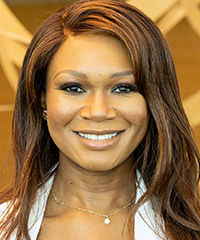Breast Imaging and Health Equity: Bridging Gaps and Improving Outcomes

Join us for a free, one-hour discussion to explore how radiologists can create a more equitable future for breast cancer care. You’ll learn more about key issues affecting different demographic groups, how new technology can be used to reduce inequities and policy initiatives that address barriers to breast cancer screening and treatment.
As a bonus, supplemental resources will be provided to webinar attendees.
Webinar details
Date & time: Oct. 30, 2024; 5–6 p.m. CT
Price: Free
This webinar will explore the critical intersection of breast imaging and health equity, addressing disparities in breast cancer screening, diagnosis, and treatment, both in the U.S. and globally. Experts will discuss current challenges, emerging technologies and strategies to improve access and outcomes for underserved populations.
Learning objectives
- Identify key disparities in breast cancer screening and diagnosis across different demographic groups.
- Describe how social determinants of health impact access to breast imaging services.
- Evaluate the potential of new breast imaging technologies to reduce health inequities.
- Outline strategies for improving cultural competence in breast imaging practices.
- Discuss policy initiatives aimed at increasing equitable access to breast cancer screening and treatment.
Planner/course director

Amy K. Patel, MD
Medical Director, Breast Radiologist, Associate Professor
of Radiology
Liberty Hospital Breast Care Center, UMKC School of Medicine
Amy K. Patel, MD, is a board-certified radiologist who specializes in breast imaging. She is the chair of cancer programs at Liberty Hospital, medical director of The Breast Care Center at Liberty Hospital and associate professor of radiology at the University of Missouri-Kansas City School of Medicine. Dr. Patel's professional interests include recruitment of women in radiology, serving as past president of the Board of the American Association for Women in Radiology. Her research interests include breast health policy and equity, digital breast tomosynthesis and artificial intelligence. She is the youngest, first female radiologist recipient of the ACR Howard Fleishon MD Advocate of the Year Award.
Planners/faculty

Randy Miles, MD, MPH
Section Chief, Breast Imaging, Associate Professor of Radiology
Denver Health, University of Colorado Anschutz
Randy Miles, MD, MPH, serves as the chief of breast imaging at Denver Health, with oversight of the breast division’s clinical, research and educational programs. He also serves as the associate director for research in the radiology department. Dr. Miles earned his medical degree from the Mayo Clinic College of Medicine, where he was awarded the Miller Award for Humanitarianism related to his work leading medical mission trips to Haiti and the Dominican Republic. He completed his diagnostic radiology residency training at the University of Illinois-Chicago, where he served as chief resident, and he completed his breast imaging fellowship training at the University of Washington Medical Center/Seattle Cancer Care Alliance.

Toma Omofoye, MD
Breast Radiologist, Associate Professor of Radiology
The University of Texas MD Anderson Cancer Center
Toma Omofoye, MD, is an associate professor of radiology in the department of breast imaging at The University of Texas MD Anderson Cancer. She completed her medical degree (diagnostic radiology) and chief residency at Duke University Medical Center and her breast imaging fellowship training at MD Anderson Cancer Center. As the inaugural director of breast imaging for the MD Anderson Global Oncology Program, she develops and implements the institution’s programs addressing breast cancer disparities in Africa, the Caribbean and around the world. Dr Omofoye’s research interests include education, learning assessments, health disparities and capacity building in low-to-middle-income countries.
RSNA would like to gratefully acknowledge Hologic, Inc. for their contribution in the form of an educational grant for this webinar.
Disclosure statements
RSNA controls the planning, development, and delivery of this CME activity and will strictly adhere to the Standards for Integrity and Independence in Accredited Continuing Education established by the Accreditation Council for Continuing Medical Education (ACCME).
Listed below are all the financial relationships provided by individuals in a position to influence and/or control CME activity content. All relevant financial relationships listed for these individuals have been mitigated. Please note that any individuals not listed below have reported no financial relationships (currently or within the past 24 months) with any ineligible company producing, marketing, selling, re-selling, or distributing health care, products used on or by patients.
None of the planners and faculty for this educational activity have relevant financial relationships with ineligible companies to disclose.
RSNA accreditation and designation statements
The Radiological Society of North America (RSNA) is accredited by the Accreditation Council for Continuing Medical Education (ACCME) to provide continuing medical education for physicians.
RSNA designates this Other activity (live and enduring material) for a maximum of 1.00 AMA PRA Category 1 Credits™. Physicians should claim only the credit commensurate with the extent of their participation in the activity.
To earn CME credit, participants must watch the full length of the webinar, as well as complete the course evaluation.
RSNA disclaimer
The opinions or views expressed in this activity are those of the presenters and do not necessarily reflect the opinions, recommendations or endorsements of the RSNA. Participants should critically appraise the information presented and are encouraged to consult appropriate resources for information surrounding any product or device mentioned. Information presented, as well as publications, technologies, products and/or services discussed, are intended to inform the learner about the knowledge, techniques, and experiences of RSNA faculty who are willing to share such information with colleagues. The RSNA disclaims any and all liability for damages to any individual user for all claims which may result from the use of said information, publications, technologies, products and/or services, and events.